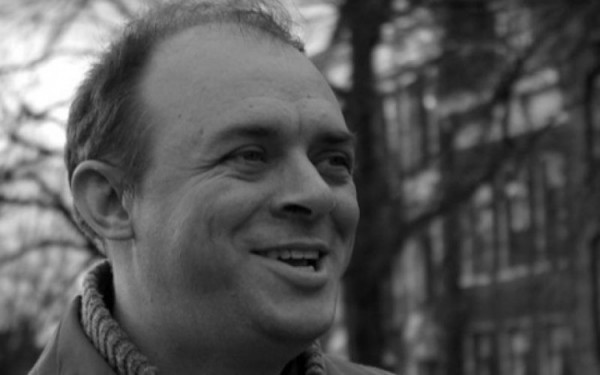Harman: “In a few more years I’ll be teaching the children of my first AUC students”
BY MENNA ABBAS
@MTA2910
![Harman ranks as the 75th most influential people by Art Review magazine [Wikimedia]](http://www.auccaravan.com/wp-content/uploads/2015/11/HarmanPhoto-Google-e1446884451946.jpg)
[Wikimedia]
Distinguished Philosophy Professor Graham Harman was ranked the 75th most influential person in the art world by the London-based ArtReview magazine on October 24.
His books tackling realism from an artistic perspective have made him not only a prominent figure in the field of philosophy but also in the field of art.
Harman was ranked previously, in 2013 and 2014, as part of a four-member group, which consisted of the main contributors to the contemporary philosophy movement speculative realism. However, this year Harman is ranked individually.
According to ArtReview,
“Harman is perhaps the thinker who has done most to popularize his own strand of ‘object-oriented philosophy’ to a wider public, especially when it comes to bringing those ideas to the art world.”
Harman, an American philosopher, has been working at AUC since 2000.
He has written a total of 11 books most recently Weird Realism: Lovecraft and Philosophy (2012) and Bells and Whistles: More Speculative Realism (2013).
In 2009, he was winner of the AUC Excellence in Research and Creative Endeavors award. The Caravan interviewed Harman to find out more about the the secrets behind his success.
What was your main goal earlier in life?
I grew up in a very small town of 3,000 people in Eastern Iowa, and though I really appreciate the place now, my main goal in childhood was to travel as often and as far away as possible.
My parents were poor young hippies who had met at a Rolling Stones concert. They had no money to spend on travel in their youthful days when I was a kid, and thus I didn’t make it to either oceans until I was 16 and not even across the border to Canada until I was 20.
Then at age 21, I started spending all of my money, all of the time, on travel to other countries. If it’s your top priority, and if you’re as uninterested in material luxuries as I am, you can see a lot of countries.
What got you into philosophy?
The strange thing is that my mother saw it coming before I did. She signed me up (without asking) for two extracurricular philosophy classes early in high school, when I was 14 and then 15 years old. I didn’t enjoy either class, and also thought that many of the other students had a better feel for the topic than I did. Some classmates were asserting confidently that justice or friendship means such-and-such, and I was confused because I had no idea how to define those sorts of words.
Only years later did I realize that this sort of uncertainty about important issues was a good sign for a potential philosopher.
We had a set of encyclopedias in the house, and I was in the habit of reading the articles whenever I wanted to learn about a new topic. One night at the age of 16, I decided to read the whole “philosophy” article, and that was it: after reading the article I knew that “this is what I am.” I’ve never considered another discipline since age 16.
In your opinion, how do philosophy and art intertwine?
Since the seventeenth century, much Western philosophy has had an inferiority complex towards the natural sciences and deductive mathematics, and has tried too hard to imitate them.
One philosopher after another has claimed to be doing philosophy more scientifically or more rigorously than everyone else. The problem is that science and mathematics try to provide knowledge. But Socrates, the father of us all in philosophy, was quite clear that philosophy is not a kind of knowledge.
The Greek word philosophia means love of wisdom, not wisdom. Art is much the same. Art like philosophy has tremendous cognitive value, yet what it gives us isn’t knowledge, but something different that needs to be better described and appreciated.
In 2013 you were ranked #81 in the London-based magazine ArtReview but this year you are #75. How did you achieve that?
In 2013 and 2014 the whole Speculative Realism group was ranked. I was one of four members of that group. This year I’m the only one left on the list, presumably for two reasons: (a) Art has a more central place in my own philosophy than in the other three; (b) I’ve been speaking a lot more than the others at art and architecture schools around the world.
Weird Realism: Lovecraft and Philosophy (2012) and Bells and Whistles: More Speculative Realism (2013) are two of your most promininent books. What is your interest in it the world of realism? How do you relate it to arts?
Realism is important to me because the question of whether or not the world exists outside the mind, a fairly basic philosophical question, has been treated with contempt for over a century in the continental (largely French- German) tradition in which I was educated.
But there’s a problem with most realisms. Most of the time realism means “there is a world outside the mind, and we can know it.”
I work in the opposite direction and say: “there is a world outside the mind, and we cannot know it, because it is so real that it cannot be fully translated into human knowledge.”
And more than that: even when two inanimate objects collide, they do not fully make contact with each other, but only with oversimplified versions of each other.
That’s why I call it weird realism. The weird means something uncanny, something we can feel or intuit or be haunted by but never quite adequately put into words.
And as I see it, philosophy is inherently weird, since we cannot always paraphrase the structure of the world in terms of clear propositional statements. Indirect, metaphorical, or allusive language is quite often needed. This point is what makes my position somewhat original, and is also what has earned me most of my supporters and nearly all of my enemies, of which there are now a considerable number.
Why did you choose AUC? What brought you to Egypt?
There used to be just one publication, called Jobs for Philosophers, where all of the teaching jobs were posted every October.
During the year after I earned my Ph.D., the two most interesting listings were AUC and AUB. Eventually AUC worked out, and I accepted the offer. The main motivation was that I had never been to the Middle East before.
Not only was it a chance to learn about Cairo and Egypt, it was also a chance to travel to all the other places to which Egypt is close. It was supposed to be a 4-year job at most, but now it’s year 16. In a few more years, I’ll be teaching the children of my first AUC students.



